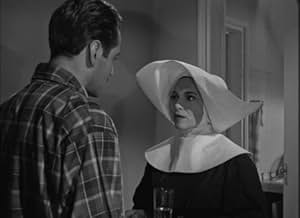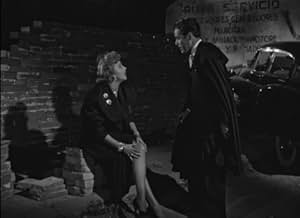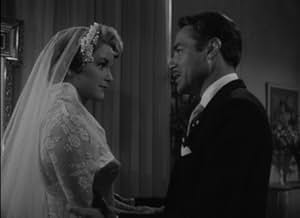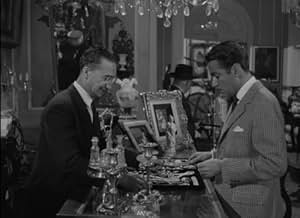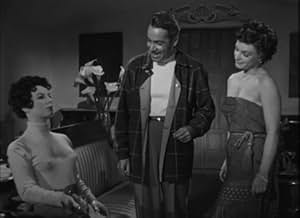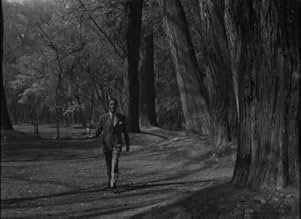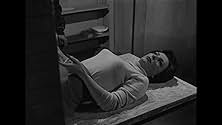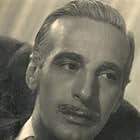IMDb RATING
7.6/10
6.2K
YOUR RATING
The delirious journey of a mentally-disordered man who is obsessed with committing the perfect crime.The delirious journey of a mentally-disordered man who is obsessed with committing the perfect crime.The delirious journey of a mentally-disordered man who is obsessed with committing the perfect crime.
- Director
- Writers
- Stars
- Awards
- 1 win & 8 nominations total
Ariadne Welter
- Carlota Cervantes
- (as Ariadna Welter)
José María Linares-Rivas
- Willy Corduran
- (as J.M. Linares Rivas)
Enrique Díaz Indiano
- Señor de la Cruz
- (as Enrique Indiano)
Carlos Martínez Baena
- Padre Alonso
- (as Carlos M. Baena)
Armando Acosta
- Hombre casa juegos
- (uncredited)
Eduardo Alcaraz
- Gordo Azuara
- (uncredited)
Janet Alcoriza
- Turista de Oklahoma
- (uncredited)
- Director
- Writers
- All cast & crew
- Production, box office & more at IMDbPro
Featured reviews
Handsome and well-heeled Archibaldo has been convinced from boyhood that he possesses a music box that has the power to kill. He embarks upon a career as a serial murderer in which his intended victims are ravishing looking females but Fate continually thwarts his lethal intentions and his murders never get past the fantasy stage.
The most notorious scene in the film and one of which only this director is capable, is where Archibaldo consigns to the flames of a kiln a wax model of one of his potential victims who has slipped through his grasp. This macabre episode has acquired a tragically ironic overtone as the woman who has modelled for the dummy is played by Miroslava Stern who was cremated shortly after filming completed, having taken her own life. Bunuel was of course to employ a 'prosthetic limb' to great effect in 'Tristana'.
Working within the budgetary limitations of Mexican cinema, director Luis Bunuel has fashioned a stylish, sophisticated and technically polished piece that contains some delicious performances and bizarre Bunuelian moments that linger long in the memory.
Although condemned by circumstances to being innocent of murder Archibaldo still feels the need to 'confess' to the police. He is politely dismissed by a detective with the words:"thinking about murdering someone does not constitute a crime." This will strike a chord with most of us I am sure!
The most notorious scene in the film and one of which only this director is capable, is where Archibaldo consigns to the flames of a kiln a wax model of one of his potential victims who has slipped through his grasp. This macabre episode has acquired a tragically ironic overtone as the woman who has modelled for the dummy is played by Miroslava Stern who was cremated shortly after filming completed, having taken her own life. Bunuel was of course to employ a 'prosthetic limb' to great effect in 'Tristana'.
Working within the budgetary limitations of Mexican cinema, director Luis Bunuel has fashioned a stylish, sophisticated and technically polished piece that contains some delicious performances and bizarre Bunuelian moments that linger long in the memory.
Although condemned by circumstances to being innocent of murder Archibaldo still feels the need to 'confess' to the police. He is politely dismissed by a detective with the words:"thinking about murdering someone does not constitute a crime." This will strike a chord with most of us I am sure!
I have often cited this as my favourite Bunuel film and one of my favourite films of all. Watching it again after a period of some years, I am surprised that it seems so light and amusing instead of dark and dangerous. I suppose this is partly because when first seen the misogyny, the gleefulness at the prospect of killing a woman, is so shocking, that we notice less the playfulness. Whereas on a subsequent viewing we are less affected, having some idea how things pan out. Is this the only Bunuel film with a seemingly happy ending? There are still, of course, many shocking moments, like the bloody/sexy death of the woman looking after him as a child, the whole business concerning the mannequins (that seems burned in my memory for ever) and the most surprising early death of the nun/nurse. Maybe it's partly that when I watched this in my youth I rightly saw it as stunningly original and displaying conduct contrary to that shown elsewhere, whereas now the old cynic in me has been exposed to much more and is smiling throughout with barely a pause for a gasp. Always going to be fun to watch though.
I don't understand why some reviewers call "Criminal Life of Archibaldo De La Cruz" (1955) - "minor" Bunuel. The only "minor" about this (and many his films) is its running time, only 89 minutes but all his films are enigmatic, odd, charming, and always brilliant. I consider Bunuel one of the best and original filmmakers ever and nothing he had done is minor for me.
"Criminal Life of Archibaldo De La Cruz is B/W comedy of Don Luis' Mexican period which is surreal, disturbing, erotic and funny satire about a perverted young wealthy man, an amateur sculptor. Since he was a boy, and one evening witnessed the sudden death of his young attractive governess and became sexually exited by it, Archibaldo De La Cruz dreams of committing a perfect crime of an attractive woman to recreate the feeling but something always prevents him from fulfilling his dreams. It does not mean that the deaths would not occur -it is just that Archibaldo can't take a credit for them. As he often did with his even unlikable and perverse characters, Bunuel gives some of his own sexual fantasies, fetishes, and dreams that he freely admits to Archibaldo thus making him more human and sympathetic.
"Criminal Life of Archibaldo De La Cruz is B/W comedy of Don Luis' Mexican period which is surreal, disturbing, erotic and funny satire about a perverted young wealthy man, an amateur sculptor. Since he was a boy, and one evening witnessed the sudden death of his young attractive governess and became sexually exited by it, Archibaldo De La Cruz dreams of committing a perfect crime of an attractive woman to recreate the feeling but something always prevents him from fulfilling his dreams. It does not mean that the deaths would not occur -it is just that Archibaldo can't take a credit for them. As he often did with his even unlikable and perverse characters, Bunuel gives some of his own sexual fantasies, fetishes, and dreams that he freely admits to Archibaldo thus making him more human and sympathetic.
Criminal Life of Archibaldo de la Cruz, The (1955)
** 1/2 (out of 4)
Luis Bunuel film that sounds more interesting than it turns out to be. As a young child, Archibaldo is told of a magical magic box that when turned on will kill. As an adult, Archibaldo comes across this box again and this times plans to use it to help him become a serial killer. There's a lot of black humor scattered throughout the film but very little of it made me laugh. The opening segments bashing the rich were funny but the film slowly falls apart in the middle and never regains any speed. The story is a very good one but the director does very little with it, which is a shame because this should have been a whole lot better.
** 1/2 (out of 4)
Luis Bunuel film that sounds more interesting than it turns out to be. As a young child, Archibaldo is told of a magical magic box that when turned on will kill. As an adult, Archibaldo comes across this box again and this times plans to use it to help him become a serial killer. There's a lot of black humor scattered throughout the film but very little of it made me laugh. The opening segments bashing the rich were funny but the film slowly falls apart in the middle and never regains any speed. The story is a very good one but the director does very little with it, which is a shame because this should have been a whole lot better.
In the 50's, in Mexico, Archibaldo de la Cruz (Ernesto Alonso) comes to a judge to confess crimes of his own. He tells his life since he was a spoiled boy, in the days of the Mexican revolution, when he won a music box from his mother and developed a bizarre desire of killing women, becoming a serial killer. In the end, this movie is a psychological dark comedy of the Mexican phase of Buñuel. I have just had the chance to see this film on DVD, recently released by the best Brazilian distributor (Versátil), and I found it another excellent work of Buñuel, one of my favorite directors ever. The story is very ironic and unpredictable, and I totally disagree with the User Comments `Minor Buñuel' indicated for this film. My vote is nine.
Title (Brazil): `Ensaio de um Crime' (`Rehearsal for a Crime')
Title (Brazil): `Ensaio de um Crime' (`Rehearsal for a Crime')
Storyline
Did you know
- TriviaThe movie was shot in the middle of a big economic crisis for the Mexican cinema. Production was about to be shut down a few times and the famous scene with the mannequin being cremated was filmed only once because they couldn't afford another mannequin.
- GoofsWhen the nun falls down the empty elevator shaft she screams loudly but the sound is obviously that of a man; in fact, it sounds like a Wilhelm Scream.
- ConnectionsFeatured in Miroslava (1993)
- How long is The Criminal Life of Archibaldo de la Cruz?Powered by Alexa
Details
- Release date
- Country of origin
- Languages
- Also known as
- Kriminalni zivot Arcibalda Kruza
- Filming locations
- Production company
- See more company credits at IMDbPro
- Runtime1 hour 29 minutes
- Color
- Sound mix
- Aspect ratio
- 1.37 : 1
Contribute to this page
Suggest an edit or add missing content

Top Gap
What is the Japanese language plot outline for The Criminal Life of Archibaldo de la Cruz (1955)?
Answer

